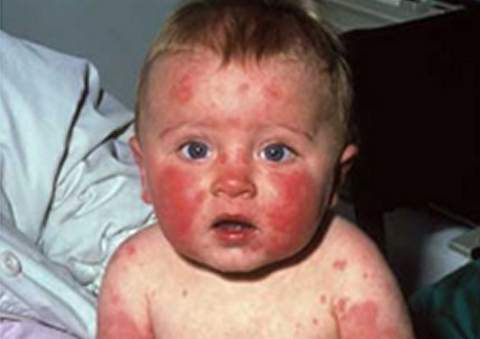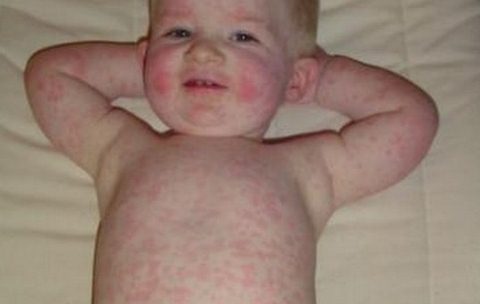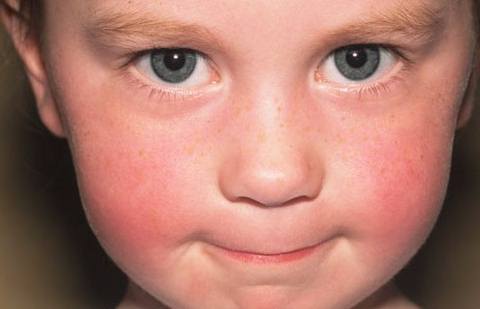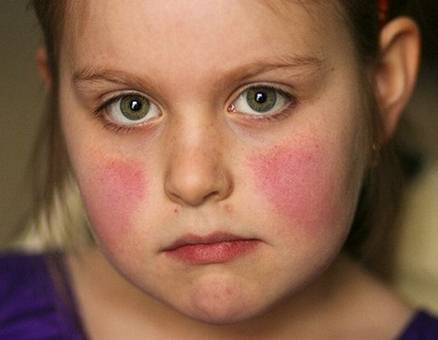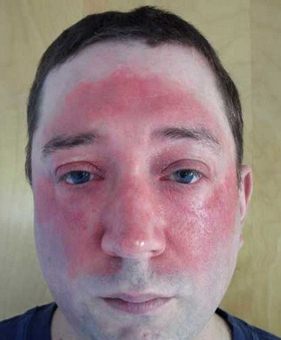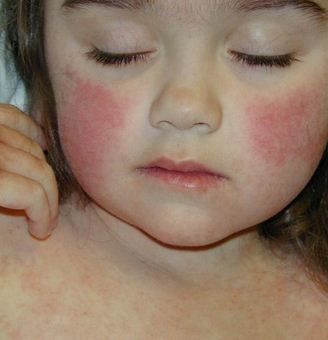Slapped Cheek Syndrome – Pictures, Symptoms, Treatment
What is Slapped Cheek Syndrome?
Slapped Cheek Syndrome is sometimes called as parvovirus infection, erythema infectiosum, Latin word which means infectious rash, or fifth disease. It is famously called as the fifth disease because of the fact that it is considered before as the 5th common disease of children. It is called as the slapped cheek syndrome because it manifests the child having bright red cheeks, as if they were actually slapped in their cheeks. The children, around the ages of 4 to 12 years old, are the ones often affected with this disease condition. It can happen, however, in any age. It is a viral form of disease condition. When one has this kind of syndrome, its incubation period is usually 4 to 20 days before the appearance of the rashes. When the rash appears, the syndrome is normally no longer infectious.
Symptoms and Signs
When a person has slapped cheek syndrome, he or she is considered infectious during the 4 to 20 days before the rashes develops. Hence, the signs and symptoms that one should watch out are the following:
- Fatigue
- Sore throat
- Runny nose
- Stuffy nose
- Slight elevation of the person’s body temperature
- Joint pain
- Light pink rash
- Neurological problems (rare)
- Cardiovascular problems (rare)
- Nausea
- Diarrhea
- Abdominal pain
- Blotchy red appears on the person’s cheeks
- Itchy
- The rash spreads through the body and it takes 3 weeks to go away.
- Headache
- Irritability
- General flu-like symptoms
- Arthralgia or joint soreness
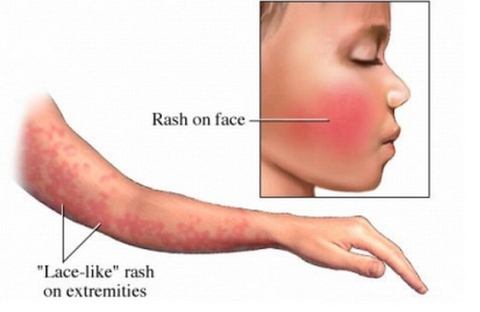
Causes and Risk Factors
The causative factor of slapped cheek syndrome is the parvovirus B19. However, there are parvovirus that is found in the cats and dogs. It is only the parvovirus B19 that is found commonly in human beings. The animals can’t be infected with the parvovirus that is associated with human beings and vice versa. The virus, itself, spreads from one person to another via airborne, direct contact, or saliva secretions of other persons.
Among the most common transmittable form of slapped cheek syndrome is through coughing, hand to hand contact, or sneezing. Those people living in a secluded, congested area are known to be risk of having this kind of syndrome. The more the immune system is compromised, as like children and sick persons, the greater the risk they have to acquire the slapped cheek syndrome.
Diagnosis
The physician usually diagnoses the slapped cheek syndrome by doing the following actions:
- Physical Examination
- Medical History
- Blood test to check for the status of your immunity
Amongst the test mentioned, the blood test is the only diagnostic test that will confirm the slapped cheek syndrome. If however, the blood test shows that the patient is immune. It means that there is no possibility that the patient will be re-infected with the syndrome. Yet, if the blood test shows that there was a recent infection of the parvovirus, it will require further examinations to find out if there is a presence of complications that requires treatment.
Treatment
There is no exact medication for the slapped cheek syndrome. It only requires supportive kind of treatment. Supportive treatment may include the following:
- Rest especially needed to prevent fatigue
- Paracetamol or Acetaminophen will relieve the fever symptoms
- Cold flannels that will relieve the hot cheek discomfort as it will lead to vascular constriction
- Adequate fluid intake to prevent dehydration especially when the person is having diarrhea
- Antihistamines to relieve the itchy symptoms
- Moisturizing lotion to soothe the itchy feeling
- NSAIDs to relieve pain
Complications
Aside from the risk mentioned above, the high risk group may be able to have complications such as:
- Infection in Pregnancy. Pregnant women can be infected before and during their pregnancy. Their babies have won’t be harmed but about 5 percent may be able to develop severe form of anemia which will lead to still birth or miscarriage.
- Persons with Weak Immunity. Persons who are sick are usually the ones who have weak immunity. They are the ones called immunocompromised persons. Once they have weak immune system, they are at risk for acquiring diseases easily. One of the diseases that they are at risk of having is the slapped cheek syndrome. They manifest the symptoms of having severe anemia, a not well feeling, and a high temperature or fever.
- Persons having Hemolytic Blood Disorders. Persons with blood disorders such as thalassemia, sickle cell anemia, and hereditary spherocytosis will have decrease hemoglobin. The most common complications are that of having severe anemia which will lead to aplastic crisis. In severe case, it will lead to having heart failure.
- Arthritis. It is a possible complication of the virus that causes this syndrome which affects the small joints in the feet and hands. Symptoms are the same with those of rheumatoid arthritis. This kind of complication occurs mostly in adults.
Prevention
As of the moment, there is no vaccination that is available in preventing the slapped cheek syndrome. Persons, who were once infected with the parvovirus B19, are already immune with this kind of disease condition.
- Hand washing. In preventing the slapped cheek syndrome, the first and safest thing to do is to practice hygienic measures such as daily washing of hands before and after eating and going to the comfort room. This kind of act will reduce the spread of infection.
- Avoid sharing of utensils. The sharing of utensils should be also avoided. Consult physician as soon as possible if you manifest the symptoms mentioned. Pregnant women, who were exposed, should consult their physicians as soon as possible to prevent further complications.
- Keep the immune system healthy. You need to keep the immune system healthy by eating well, having a complete eight hours sleep and consuming vitamins to prevent acquiring the disease condition.
